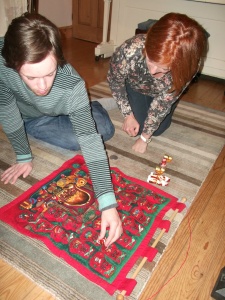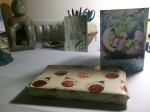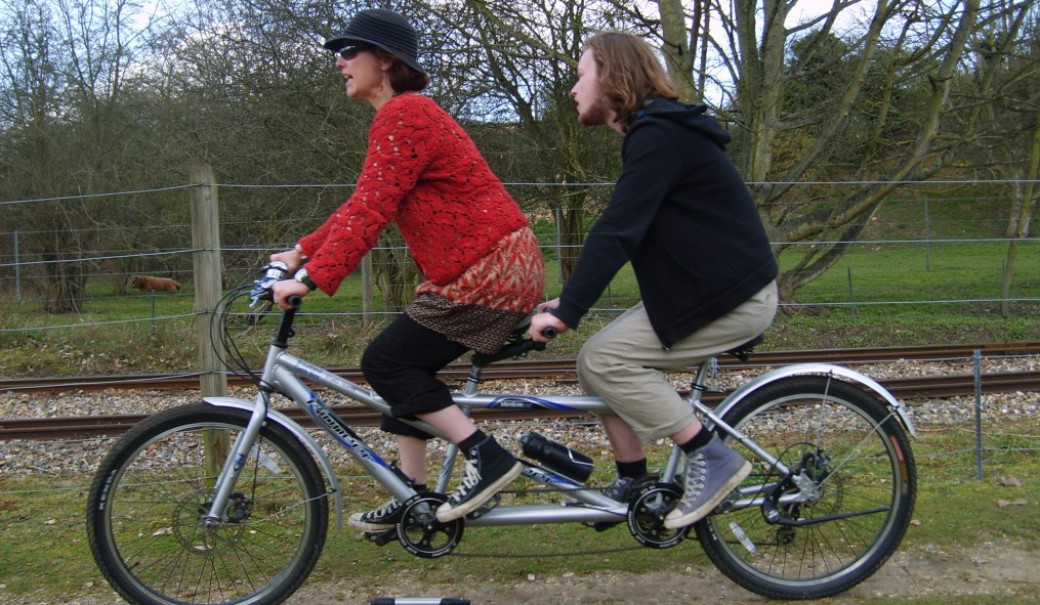 ‘Happy St Nicholas Day’ I said to an Erasmus student as we finished up class the other week. It was 6th December and as she is German I guessed she would be celebrating. Leaving clogs out overnight for St Nicholas to put chocolate coins in is something I’ve done with my children for years. We observe a number of rituals through the Advent season which have different meanings for each of us and which I think help Dylan along the route to Christmas.
‘Happy St Nicholas Day’ I said to an Erasmus student as we finished up class the other week. It was 6th December and as she is German I guessed she would be celebrating. Leaving clogs out overnight for St Nicholas to put chocolate coins in is something I’ve done with my children for years. We observe a number of rituals through the Advent season which have different meanings for each of us and which I think help Dylan along the route to Christmas.
Advent And Autism
 The first sign for Dylan that Christmas is coming is the day I fetch our Advent calendar from the cellar. We have had the cloth calendar since Dylan was a toddler so it’s a familiar object to him. Counting out chocolate coins or gingerbread stars and filling the pockets is an activity he recognises and knows will be followed by other seasonal routines. After the calendar is in place and St Nicholas has visited, Dylan plays his Christmas DVDs. He borrows ‘The Snowman’ on his weekly trip to the library instead of ‘Thomas the Tank Engine’. With uncanny accuracy, he predicts the day for decorating the tree, baking the vanilla kipferl and lighting candles.
The first sign for Dylan that Christmas is coming is the day I fetch our Advent calendar from the cellar. We have had the cloth calendar since Dylan was a toddler so it’s a familiar object to him. Counting out chocolate coins or gingerbread stars and filling the pockets is an activity he recognises and knows will be followed by other seasonal routines. After the calendar is in place and St Nicholas has visited, Dylan plays his Christmas DVDs. He borrows ‘The Snowman’ on his weekly trip to the library instead of ‘Thomas the Tank Engine’. With uncanny accuracy, he predicts the day for decorating the tree, baking the vanilla kipferl and lighting candles.
But Christmas has not always been so easily prepared and waited for. When he was younger the presence of the calendar was agony for Dylan. I was determined to keep the practice (one that I’d enjoyed as a child) for my daughter and step-daughter. Each year the girls carefully worked out the rotation of pockets and who got which, depending on the pattern of my step-daughter visiting and Dylan being in respite. This was complicated maths and diary work and the girls pored over it together each year to ensure the distribution of advent sweets was fair and equitable. Imagine their distress, then, the year that Dylan woke up early, went downstairs, and ate all the chocolates from the carefully-planned pockets. For the next few years we hung the calendar in a high place and lifted the children up when it was their turn. And during those years we worked hard on ‘waiting’ and on ‘asking’ until we were fairly certain that Dylan wouldn’t raid the calendar overnight.
Dylan is 19 now and it has taken years of rehearsing these rituals for him to develop the practice of waiting. And waiting and preparation are what Advent is about; during this time we are readying ourselves and our homes. Whether or not we approach Christmas from a Christian perspective, the process of waiting and the act of receiving are at the heart of the season. Neither of these concepts is easy if you are autistic – and if you are an autistic child, waiting is likely to be extremely difficult. Why? I sometimes ask myself. Why is waiting so hard?
Impatience Is A Virtue
‘Impatience is a virtue’ a student emailed me, trying to justify her request that I let her know her results early. And why, indeed, should we assume the opposite? All sorts of things can go wrong if you make yourself wait. And while this student’s results weren’t going to change, some things are spoiled while we are being patient: figs over-ripen; films close; friends change their mind.
 We have a tradition of celebrating winter solstice by waiting until the shortest day of the year to put up the tree. This is my tradition rather than a shared practice; in fact I am against the grain as in recent years people in my neighbourhood have been putting their trees up earlier and earlier. Once my children were old enough to notice and care, my solstice tree tradition became an irritation to my daughter and a frustration for Dylan; everyone else, it seemed, had their tree up already. I doggedly held on to our tree ceremony until the year came when there were fewer trees available for some reason and by the time we went to get ours there were none to be had. Eventually a trader led us to his underground garage to show us a tree that someone had returned, complaining that it was an unattractive shape and lacked branches. It was late in the day and we were out of options: we spent the Christmas holiday trying to work miracles with lametta and lamenting the tree’s thinness. ‘I don’t know why we always have to wait’ my daughter complained, ‘it’s ridiculous’.
We have a tradition of celebrating winter solstice by waiting until the shortest day of the year to put up the tree. This is my tradition rather than a shared practice; in fact I am against the grain as in recent years people in my neighbourhood have been putting their trees up earlier and earlier. Once my children were old enough to notice and care, my solstice tree tradition became an irritation to my daughter and a frustration for Dylan; everyone else, it seemed, had their tree up already. I doggedly held on to our tree ceremony until the year came when there were fewer trees available for some reason and by the time we went to get ours there were none to be had. Eventually a trader led us to his underground garage to show us a tree that someone had returned, complaining that it was an unattractive shape and lacked branches. It was late in the day and we were out of options: we spent the Christmas holiday trying to work miracles with lametta and lamenting the tree’s thinness. ‘I don’t know why we always have to wait’ my daughter complained, ‘it’s ridiculous’.
Perhaps it is ridiculous to insist on waiting. How many times are we let down by something which turns out not to be worth the wait? Perhaps by not waiting you can avoid disappointment; if there is no anticipation there can be no anti-climax. Is this the world that Dylan inhabits perhaps? A world without anticipation but without disappointment either?
Living In The Present Tense
A friend told me that a neighbour had once said to her: ‘walking into your house is like walking into the present tense’. I was intrigued by this. Presumably she meant the house was busy with activity in-itself and of the moment. Walking into Dylan’s room is a bit like walking into a loop-tense of past, present and future: the case of the DVD he is currently watching in its place, with the previous and next DVDs lined up in their places. This physical ordering of the past, present and future means that there is a sense in which it is all happening simultaneously for Dylan.
The Amondawa in Brazil lack an abstract concept of time in that they do not map events onto a space continuum. Because time-space mapping is not part of the culture, their linguistic structures don’t reference time: ‘working through the night’, ‘after Wednesday’, ‘in a while’ or ‘at Christmas’ would be constructs without meaning to the Amondawa. As they age the Amondawa assume different names to reflect their changing role in the community rather than describe themselves, as we do, in relation to time; a lovely idea, a bit like hermit crabs adopting ever-larger shells.
Dylan would be comfortable, I think, with the Amondawa. For years at school he has encountered ‘days of the week’ and visual calendars, but he still struggles with the concept of sequencing of events, particularly if they take place over a period of days. ‘One sleep’ I say to him when he goes to respite, but I’m not sure what sense he makes of this; time-space mapping isn’t really part of his world. If the future is an uncertain concept, then the idea of waiting for it must be very challenging. So if I ask Dylan to wait for something I try to make sure it happens as promised so that he receives reinforcement for waiting. The reward, however, is not always what Dylan expects; when the bus I ask him to wait for turns up, it may be the wrong one. Perhaps, for Dylan, it is this quality of the unexpected which makes the future less desirable than the now.
Future Unexpected: Blessings and Possibilities
 If learning how to wait is helping Dylan to understand the concept of future time then perhaps part of this requires him to experience the unexpected as well as the predictable. Yesterday, at work, I found a Christmas present which somebody had left for me. It’s on my desk as I type and I’m wondering whether I ought to hide it before Dylan comes back from respite. If he sees a present he might think it’s Christmas this weekend and he’ll probably assume it’s for him. For the moment, while Dylan’s away, I’m enjoying my unopened gift. The ex-student who left it for me has emailed that she wouldn’t be able to save it, but I’m savouring the anticipation of opening it and enjoying the thought that she remembered me. And it occurs to me that these are the qualities of waiting that I’ve come to appreciate most: the unexpected blessings and possibilities which tomorrow may bring.
If learning how to wait is helping Dylan to understand the concept of future time then perhaps part of this requires him to experience the unexpected as well as the predictable. Yesterday, at work, I found a Christmas present which somebody had left for me. It’s on my desk as I type and I’m wondering whether I ought to hide it before Dylan comes back from respite. If he sees a present he might think it’s Christmas this weekend and he’ll probably assume it’s for him. For the moment, while Dylan’s away, I’m enjoying my unopened gift. The ex-student who left it for me has emailed that she wouldn’t be able to save it, but I’m savouring the anticipation of opening it and enjoying the thought that she remembered me. And it occurs to me that these are the qualities of waiting that I’ve come to appreciate most: the unexpected blessings and possibilities which tomorrow may bring.


Another wonderful post, Liz – so thought provoking. Thank you…
Wishing you, Dylan and all your family a lovely Christmas and happy holiday-time,
Melanie.
LikeLike
Thank you Melanie – solstice blessing and happy holidays to you and your family. I think it is going to snow! Liz x
LikeLike
The awareness of time brings it’s own challenges. When school was let out for Winter Vacation my mother told my brother that there was no more school. He paused, contemplating that statement, then asked hopefully “No more school ‘Ever’?” He was not happy with the response.
Now he asks everyday repeatedly, “We stay home today?” Life is a sequence for events for him, and he needs to be constantly reassured of future plans. For example every week he goes grocery shopping with my mother. Friday evening he will announce “We go sleep, wake up, go shopping, DJ gets toy!” I would say that he doesn’t understand the abstract future, but he does understand cause and effect.
I’m not quite sure what he believes about Santa though. He’s been watching a lot of Christmas movies this past year so he is aware of the concept. (His behavior was much better. When he misbehaved we warned him to be good or Santa wouldn’t bring him any presents. Then he’d gasp dramatically and calm down.)
Still it’s a little odd. Normally, children believe in Santa and then realize their parents actually purchase the presents. Until this Christmas, my brother has always believed that the gifts came from our parents. Now all of a sudden he believes that Santa brings presents.
LikeLike
Hi there – good to hear more about your brother. How interesting that he has developed a belief in Santa as he has got older rather than lost it 🙂 I’m not sure if Dylan used to think I bought him the presents, but it’s certainly the case that his belief in Santa is increasing (probably, as with your brother, helped by Christmas movies). You’re so right about the the challenge of time, and not understanding abstract future. You describe it really well. Every night as Dylan goes to bed he gets out a backpack which somehow or other has come to represent ‘what will happen tomorrow?’. I have to tell him what will happen several times before he puts the pack down and gets into bed. The quizzical, slightly anxious, look in his eye every night is hard – the constant need to explain and reassure about what will happen. I think maybe time is one of the most difficult things to understand. I’m not convinced that Dylan realises he was once a baby for example. I thought I might try and do something simple about the passage of time in relation to him growing up, and that it might help with the idea of the future – but as you say it’s just so abstract. I suspect that things will go on happening in the present tense with us for a while… Liz
LikeLike
Pingback: Walking Without A Map | Living with Autism
Pingback: Autism and Landscape | Living with Autism
Pingback: Day 94: Tap, Tap, Tap | Living with(out) Autism